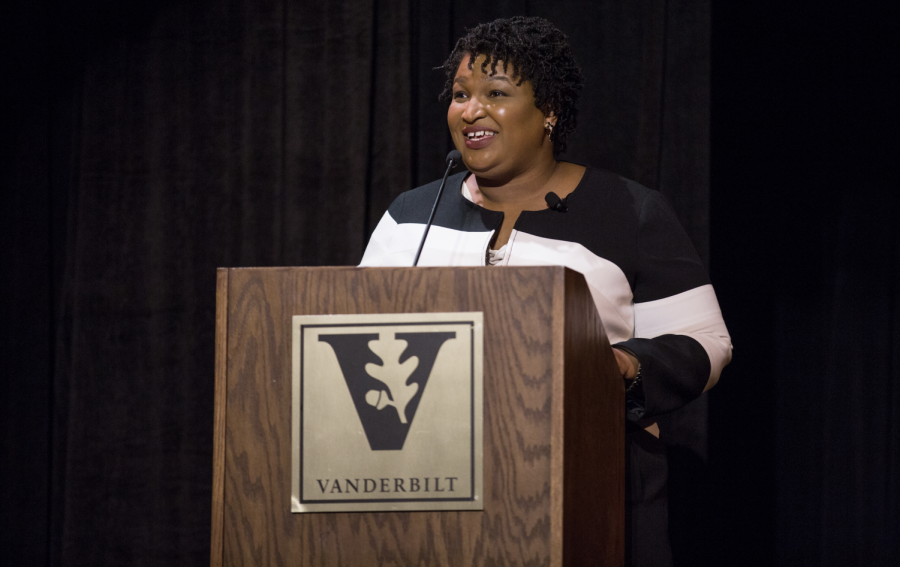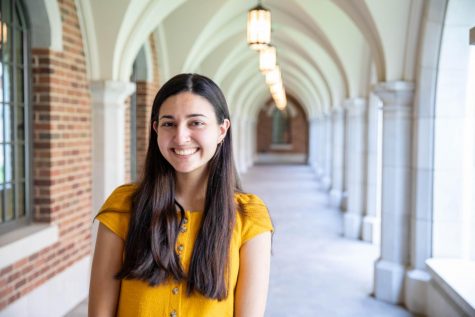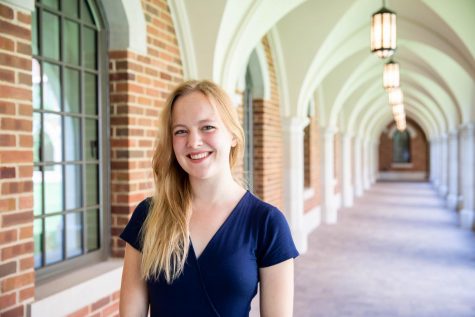In a charming, witty and realistic speech to a packed audience in Langford Auditorium, Stacey Abrams reflected on her campaign, her book and what she calls the darkest day of her life, November 16, when she ended her bid for governor, though did not concede the election.
Chancellor Nicholas Zeppos hosted Abrams in the second Spring installment of the Chancellor’s Lecture Series March 19. Abrams launched into the mainstream last year, when she made history as the first Black woman in America to be nominated for gubernatorial candidacy by a major party. Before, she served 11 years in her state’s lower house, and she is also an author. In addition to her recent book, Lead from the Outside, she has written 6 romance novels under the pseudonym Selena Montgomery.
“Being a storyteller is the beginning of being good at politics,” Abrams said. “People need to know how they fit into what you’re doing.”
One of the cornerstones of Abram’s campaign and her advocacy since entering politics has been voter access and irregularities. When she went to vote in her own gubernatorial election, she was told that she had already voted via absentee ballot. She said that if this was what was happening to her, it was easy to see how voters who didn’t have her political understanding or camera crews following them could be easily disenfranchised.
The election, as a result, was not only unfair, but inaccurate, she said. This idea of voter suppression is a much larger issue than voter fraud; people aren’t trying to vote three times when they are barely voting once, she said.
“It has the psychological effect that you can’t beat the system, that it doesn’t matter,” she said.
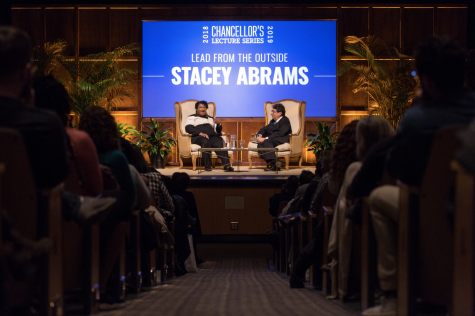
Her realization of the extent of voter suppression led to a transformation in her mission. Instead of wallowing in her defeat, she decided to translate her anger into action, she said. Since losing her gubernatorial bid, she has started a number of organizations, including Fair Fight Action, which is centered around fighting voter suppression.
“This was larger than me becoming the governor of Georgia,” she said.
Despite her loss, Abrams has become a strong voice in the Democratic Party. Senate Majority leader Chuck Schumer asked Abrams to deliver the Democratic response to the State of the Union address.
Her and Zeppos’ conversation turned to her beliefs and leadership in the bigger picture. She named the three areas of policy most important to her politics: economic security, education and health care.
Abrams wrote her latest book on running for office, while running for office. With a notable sense of realism and candidness, Abrams laid out her strategy when she ran for office, how she reached voters without falling into pandering and how she balanced the practicality of leaning into her base while also getting to know all the citizens she hoped to represent. That truth, she said, is what led to the massive increases in voter turnout that Georgia saw in the 2018 midterm elections. Specifically, she noted the high turnout rates of hispanic and black voters, as well as white democrats.
Abrams also addressed her time in college. As an undergraduate at Spelman, she related to the typical college student experience of feeling unsure about her future. In fact, she attempted to take on 7 majors and minors combined – despite often failing to attend her classes, she said.
“I had to understand the difference between dreams and ambition,” she said. “Dreams are fleeting they come and they go, ambition is something that keeps you awake, that animates you. If you can put it aside and walk away, then it’s not ambition, it’s a dream. Ambition is something that drives you. And you have to think about it, because it’s also usually something that’s not clear.”
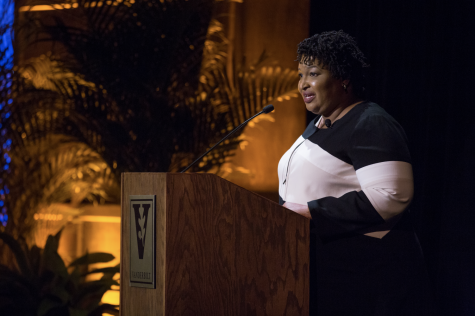
Eventually, the conversation turned to 2020. Abrams recently met with former Vice President Joe Biden about the potential for 2020. Biden indicated his plans for a presidential run to a number of his supporters March 20. Despite hinting at a presidential campaign herself, Abrams has yet to share her plans for 2020; currently, she is meeting with presidential candidates. She said that she’s willing to speak with anyone, so long as they come to her ready to address what they’re going to do about voter suppression and that they recognize Georgia as a swing state.
Finally, two students were given the chance to ask Abrams questions. In response to a question on the source of her optimism, Abrams responded that optimism isn’t what drives her – rather, instead of trying to fix things, she strives to first make them better. And she says the most important part of trying to make things better is voting.
“If young people had the same recognition of their power– we do a lot through voter suppression and other things to convince you your power isn’t real. That’s a lie,” she said. “You have extraordinary power, and if you harness that power, you can get what you want.”



